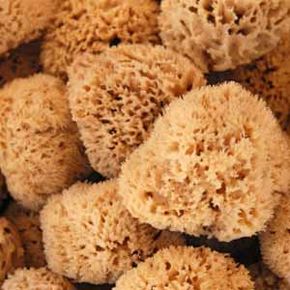Take a stroll through the bath and beauty section at any store, and you'll find a wide array of scrubbers and scourers to help cleanse you from head to toe. If you go looking for sponges, you'll find that man-made sponges far outnumber the natural ones. Having more synthetic products than natural ones to choose from doesn't necessarily mean that sea sponges are inferior -- they're just different.
You might have wondered where sea sponges come from. Sea sponges have been around for hundreds of millions of years. Natural sea sponges might appear to be an unusual seaweed or other kind of plant, but because they grow by consuming organic materials instead of by photosynthesis, they're actually classified as animals that live in the water. Sponges are grouped into three categories, based on whether their skeletons are made of organic matter, calcium carbonate or glass. Sea sponges have the ability to continue growing even if you chop them up into pieces. This means that you can harvest a piece of a sea sponge and it will regenerate [source: Australia National University Reporter]. Of course, by the time a sea sponge makes it to your tub, it won't still be growing because it's no longer living.
Advertisement
Before you start scrubbing at yourself with any kind of sponge, you should think about the condition of your skin. If you have any skin conditions, such as eczema or contact dermatitis, then make sure to be extra gentle if you decide to use the sponge. Also, if you have dry skin, using a scratchy sponge might just irritate it [source: Griffin]. Keep the overall health of your skin in mind before you decide whether you want to use a sponge, and use it as a guideline to pick out the texture and type.
If you're ready to explore the world of washing with sponges, the first step is deciding whether to go with man-made or natural sea sponges. Read on to learn the pros and cons of using natural sea sponges.
Advertisement


